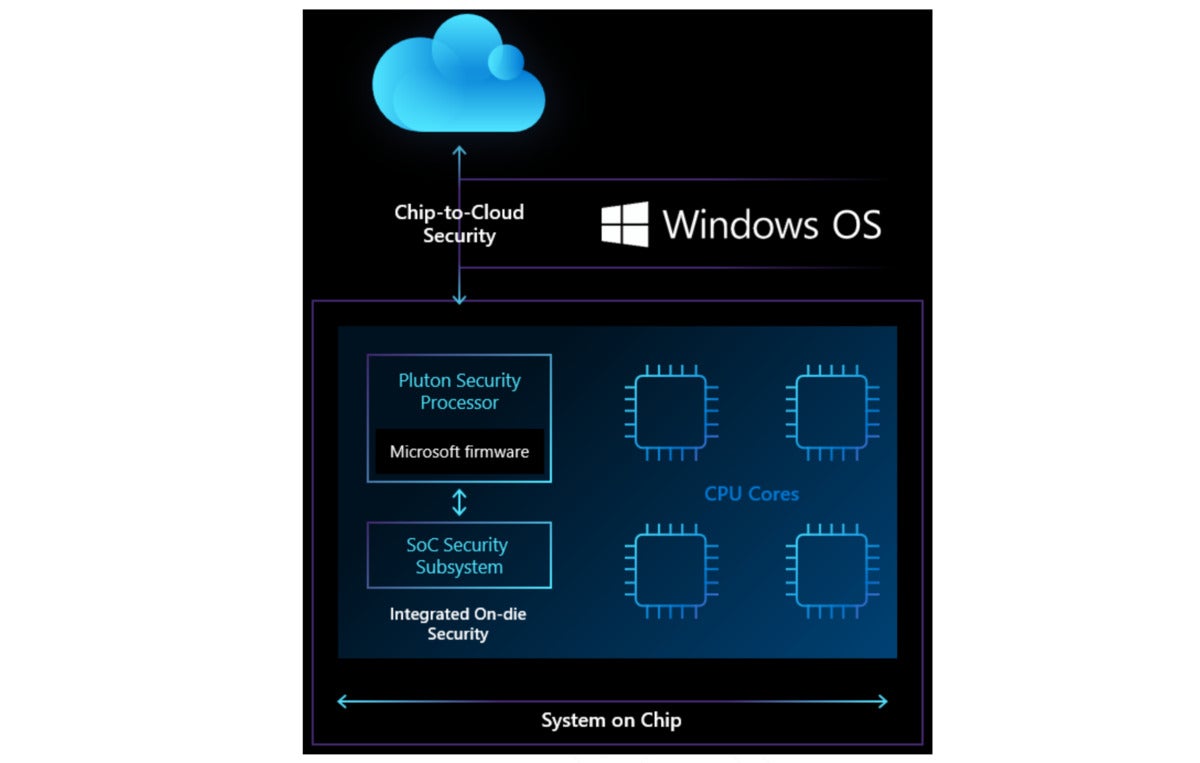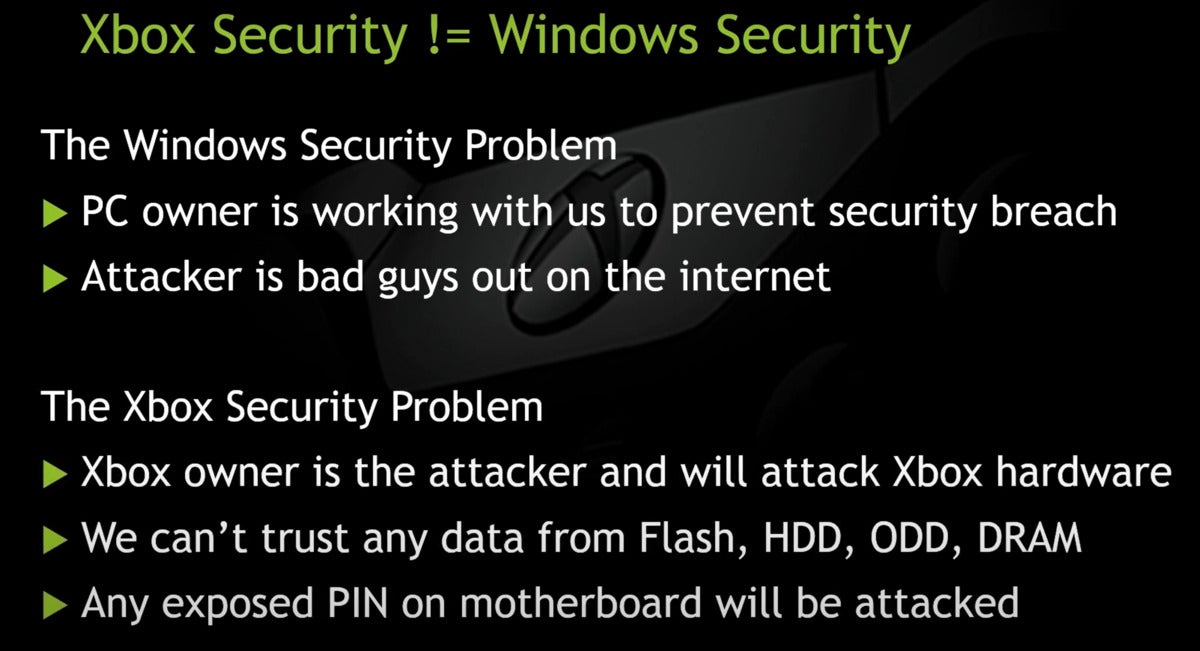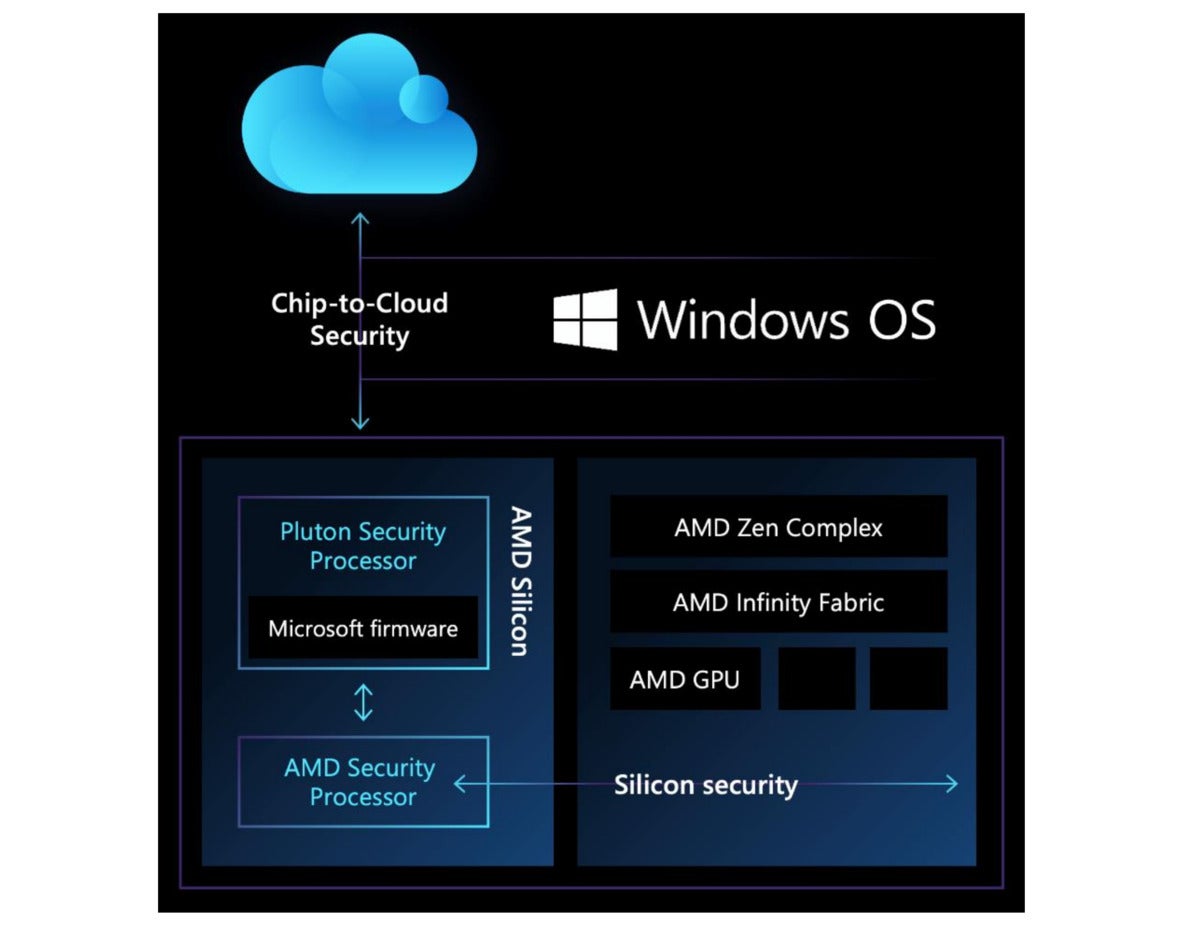Pluton, a technology Microsoft and AMD co-developed to prevent the Xbox from being hacked, will be added to Windows PCs via the CPUs themselves to provide additional security, the companies said Tuesday,
According to Microsoft, Pluton helps greatly eliminate the chance that the PC’s Trusted Platform Module (TPM) will be compromised. The TPM creates a root of trust, governing a number of critical functions within the PC: guaranteeing that it will securely boot with the trusted combination of hardware and software, for example, and securely update to trusted firmware. Windows’ BitLocker disk encryption system uses the TPM, as do other Windows components.
Traditionally, the TPM has existed outside of the processor, connecting to it via an external bus. Now it will be integrated within AMD, Intel, and Snapdragon CPUs itself—though when, and in which processors, remains very murky for now. What this means, however, is that there will be a third-party logic block built into an Intel Core or AMD Ryzen system-on-chip, which will create its own secured channel to Microsoft’s Azure service to manage trusted updates. Microsoft is also seizing the opportunity to manage your PC’s firmware updates, which sounds like it could mean that the firmware your motherboard and PC supplier provides could be replaced with Windows Update.
Pluton cannot completely secure your PC. But Microsoft says Pluton will dramatically improve how your laptop protects your data, even if the attacker has physical possession of your stolen laptop.
 Microsoft
Microsoft
Microsoft’s Pluton tries to secure the PC from the chip to the cloud.
Pluton: From the Xbox to the PC
In 2003, AMD, Cisco, IBM, Intel, and Microsoft formed the Trusted Computing Group, which outlined the specifications to define the Trusted Platform Module. Those chips, produced by a variety of manufacturers, sit on a PC’s motherboard and communicate with the rest of the system via the SPC or LPI bus. This bus is the vulnerable component, provided the attacker has physical access to the laptop itself. An attacker with a logic analyzer could sniff the bus for what’s known as the Volume Master Key, and then use it to decrypt a Bitlocker-encrypted hard drive or SSD on a stolen laptop.
Pluton was implemented to prevent that. Instead of adding a TPM which communicates via an external bus to the CPU, the Pluton security processor becomes part of the CPU itself, as part of a system-on-a-chip design. (It’s not clear whether Pluton will be a logic block within the CPU die itself, or another discrete die that’s connected within the chip package. Referring to it as the “Pluton processor,” though, implies the latter.)
Pluton has already been proven out via two Microsoft projects: the Azure Sphere IoT device, and the 2013 Microsoft Xbox One console. The latter is the strongest argument for Pluton’s viability.
As Tony Chen, Microsoft’s platform security architect, noted at Microsoft’s 2019 Bluehat conference, Windows security is devoted to protecting the Windows user from external attackers; Xbox security is designed to protect the console from the physical owners, some of whom may wish to crack the hardware to gain access to pirated games, or to cheat in online games. “Basically we start with the simple rule that we can trust the CPU die, but nothing else outside of it,” Chen said in his 2019 presentation about securing the Xbox.
Think of the Xbox is a walled garden, only able to run code that Microsoft itself has signed. Since Xbox multiplayer games like Player Unknown’s Battlegrounds or Call of Duty: Warzone aren’t plagued by cheaters, it’s an argument that Microsoft’s Pluton has already survived its trial by fire.
 Microsoft / YouTube
Microsoft / YouTube
How Microsoft sees Windows security relative to the Xbox.
What will Pluton do?
Pluton will do two things. First, it will “emulate a TPM that works with the existing TPM specifications,” so that it will be able to step in and serve as a TPM for BitLocker and Windows Defender System Guard and its secure-boot feature. (“Microsoft Pluton is designed to perform the same functions as TPMs in the boot process along with added security features, and is in isolation from the rest of the silicon,” Microsoft says.)
Sensitive data like encryption keys will reside securely within the Pluton processor, which is isolated from the rest of the system, helping to ensure that emerging attack techniques, like speculative execution, cannot access key material, Microsoft said in a blog post.
Second, Pluton will centralize system firmware and patching, from a variety of different sources to just one, that is “authored, maintained, and updated by Microsoft.”
“One of the other major security problems solved by Pluton is keeping the system firmware up to date across the entire PC ecosystem,” Microsoft said in a blog post. “Today customers receive updates to their security firmware from a variety of different sources than can be difficult to manage resulting in wide-spread patching issues. Pluton for Windows computers will be integrated with the Windows Update process in the same way that the Azure Sphere Security Service connects to IoT devices.” The post suggests that system apps such as Lenovo’s Vantage software or the MyAsus utility on Asus laptops might be replaced by Windows Update. Perhaps future motherboard and even GPU driver updates would be centrally managed by Microsoft as well.
What Pluton means for AMD, Intel, and Qualcomm
What we don’t know, however, is how, when, and where the three major PC makers will be implementing Pluton. For now, their answers are vague.
Considering that AMD helped co-develop the Pluton approach on Xbox, you might think that the company would aggressively implement it. Yes and no. In a blog post, AMD said it would be the first x86 silicon provider to offer the Microsoft Pluton security processor on future AMD Client APUs and CPUs. But which ones? AMD isn’t saying.
“We can confirm Pluton will be part of future Ryzen Mobile Processors, but can’t comment further at this time,” a spokeswoman for the company said in response to PCWorld’s questions.
 AMD
AMD
AMD’s Pluton diagram is slightly different than Microsoft’s own, showing how it will work with its own silicon.
Furthermore, the Microsoft Pluton security processor won’t replace AMD’s own; they’ll co-exist. “Pluton helps provide security to Windows PC systems by acting as an integrated hardware root of trust for the Windows ecosystem while ASP acts as the silicon hardware root of trust which helps provide integrity by authenticating initial firmware loaded on the platforms,” AMD said in a blog post.
Qualcomm was equally vague. It, too, said that it has an existing Security Processing Unit built into Snapdragon hardware, according to a company spokeswoman, but declined to go into specifics on its Pluton implementation. “We believe an on-die, hardware-based Root-of-Trust like the Microsoft Pluton is an important component in securing multiple use cases and the devices enabling them,” Qualcomm added, in a statement attributed to Asaf Shen, senior director of product management at Qualcomm.
An Intel representative added some additional detail. “Intel plans to partner with Microsoft to build these significant advancements in security into our client CPUs in future platforms,” the Intel spokesman said, adding that Pluton will be added “in the next few years.”
The Intel representative declined to specify whether Pluton would be added to mobile, server, or desktop CPUs, what its effect on CPU die sizes would be, and whether Intel would pay royalties to Microsoft in return. It’s also not clear whether Intel’s timeline for adding Pluton “in a few years” will apply to AMD as well.
Many questions remain
With TPMs already the default for most laptops today, it’s unlikely that integrating Pluton within the CPU will have a significant impact on most users. But if Pluton becomes the default on PC platforms across the board—desktop, mobile, even server—as part of the CPU, that would imply that trusted computing would become part and parcel of the PC landscape. What impact would that have on driver updates? Would it establish trusted code for PC gaming, locking out hacks and other mods? Could PC gaming become as free from cheaters as consoles?
Microsoft said late Monday that it sees managing firmware updates as an alternative to the role hardware makers already play. “OEMs can still maintain control and manage firmware updates if they choose, but we are providing another choice for customers to receive all of their critical security patches in one place through the Windows Update process,” a Microsoft representative said in a statement. “One of the difficulties IT teams face today is knowing where to find their most important patches and how to install them. By bringing these updates into the Windows Update process, we are streamlining this process for them so they are less likely to miss an important update.”
Until we know more of what Microsoft intends to do with Pluton on the PC, and how chipmakers and even software makers plan to implement it, we won’t know how Windows PCs will change with the addition of Pluton. We can probably say, however, that the Xbox’s hack-free existence is a positive sign that Pluton’s approach could work.
This story was updated at 9:37 AM with additional information.
